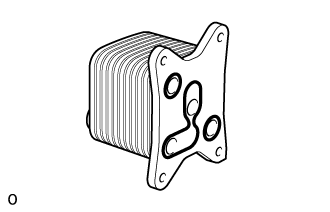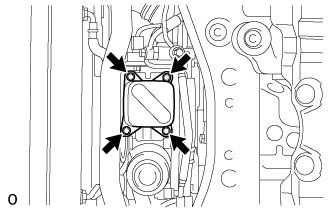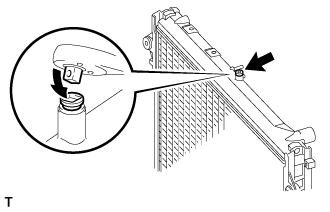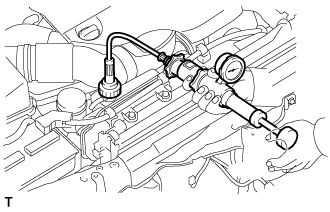Land Cruiser URJ200 URJ202 GRJ200 VDJ200 - 1VD-FTV LUBRICATION
ENGINE OIL COOLER - INSTALLATION
| 1. INSTALL OIL COOLER ASSEMBLY |

Apply a light coat of engine oil to 2 new O-rings and a new oil cooler gasket, and set them to the oil cooler.

Install the oil cooler with the 2 bolts and 2 nuts.
- Torque:
- 21 N*m{ 214 kgf*cm, 15 ft.*lbf}
| 2. ADD ENGINE OIL |
Add fresh oil.
- Standard Engine Oil:
Item Oil Grade Oil Viscosity (SAE) w/ DPF ACEA C2
(Using engine oil other than ACEA C2 may damage catalytic converter)- 0W-30
- 5W-30
(0W-30 is best choice for fuel economy and good starting in cold weather)w/o DPF G-DLD-1, API CF-4, API CF or ACEA B1
(You may also use API CE or CD)- 5W-30
- 10W-30
- 15W-40
- 20W-50
(5W-30 is best choice for fuel economy and good starting in cold weather).
- Standard Capacity:
Item Specified Condition Drain and refill with oil filter change 9.2 liters (9.7 US qts, 8.1 Imp. qts) Drain and refill without oil filter change 8.2 liters (8.7 US qts, 7.2 Imp. qts) Dry fill 9.9 liters (10.5 US qts, 8.7 Imp. qts)
Install the oil filler cap.
| 3. ADD ENGINE COOLANT |

Remove the engine air bleed cap.

Connect a clear hose to the engine air bleed pipe.

Using a wrench, remove the vent plug.

Fill the radiator with TOYOTA SLLC to the radiator reservoir filler neck.
- HINT:
- Pour TOYOTA SLLC until it spills out of the engine air bleed pipe.
- Standard Capacity (for Automatic Transmission):
Item Specified Condition Front heater only 14.8 liters (15.6 US qts, 13.0 Imp. qts) Front heater and rear heater 17.6 liters (18.6 US qts, 15.5 Imp. qts) Front heater with viscous heater 15.2 liters (16.1 US qts, 13.4 Imp. qts) Front heater and rear heater with viscous heater 18.0 liters (19.0 US qts, 15.4 Imp. qts)
- Standard capacity (for Manual Transmission):
- 15.4 liters (16.3 US qts, 13.5 Imp. qts)
- NOTICE:
- Do not substitute plain water for engine coolant.
- HINT:
- TOYOTA vehicles are filled with TOYOTA SLLC at the factory. In order to avoid damage to the engine cooling system and other technical problems, only use TOYOTA SLLC or similar high quality ethylene glycol based non-silicate, non-amine, non-nitrite, non-borate coolant with long-life hybrid organic acid technology (coolant with long-life hybrid organic acid technology consists of a combination of low phosphates and organic acids).

Install the vent plug.
- Torque:
- 2.0 N*m{ 20 kgf*cm, 18 in.*lbf}
- NOTICE:
- Do not tighten the plug to 5.0 N*m (51 kgf*cm, 44 in.*lbf) or more, as the plug will be damaged.

Disconnect the clear hose from the engine air bleed pipe.

Install the engine air bleed cap when coolant comes out.
Install the radiator reservoir cap.
Start the engine.
- NOTICE:
- Immediately after starting the engine, if the radiator reservoir does not have any coolant, perform the following: 1) stop the engine, 2) wait until the coolant has cooled down, and 3) add coolant until the coolant is filled to the FULL line.
Maintain an engine speed of 3000 rpm for approximately 10 minutes so that the thermostat opens and air bleeding is performed.
- CAUTION:
- NOTICE:
- HINT:
- The thermostat opening timing can be confirmed by pressing the No. 2 radiator hose by hand, and checking when the engine coolant starts to flow inside the hose.
Stop the engine, and wait until the engine coolant cools down to ambient temperature.
- CAUTION:
- Do not remove the radiator reservoir cap while the engine and radiator are still hot. Pressurized, hot engine coolant and steam may be released and cause serious burns.

Check that the coolant level is between the FULL and LOW lines.
If the coolant level is above the FULL line, drain coolant so that the coolant level is between the FULL and LOW lines.
| 4. INSPECT FOR ENGINE OIL LEAK |
Warm up the engine and check for an engine oil leak.
| 5. INSPECT FOR COOLANT LEAK |
- CAUTION:
- Do not remove the radiator reservoir cap while the engine and radiator are still hot. Pressurized, hot engine coolant and steam may be released and cause serious burns.

Fill the radiator with coolant and attach a radiator cap tester to the radiator reservoir.
Warm up the engine.
Using the radiator cap tester, increase the pressure inside the radiator to 123 kPa (1.3 kgf/cm2, 17.8 psi), and check that the pressure does not drop.
If the pressure drops, check the hoses, radiator and water pump for leaks.
If no external leaks are found, check the cylinder block and cylinder head.
| 6. INSTALL NO. 1 ENGINE UNDER COVER SUB-ASSEMBLY |
Install the No. 1 engine under cover with the 10 bolts.
- Torque:
- 29 N*m{ 296 kgf*cm, 21 ft.*lbf}
| 7. INSTALL FRONT FENDER SPLASH SHIELD SUB-ASSEMBLY RH |
Install the front fender splash shield RH with the clip, and then install the 3 bolts and 2 screws.
| 8. INSTALL FRONT FENDER SPLASH SHIELD SUB-ASSEMBLY LH |
Install the front fender splash shield LH with the clip, and then install the 3 bolts and screw.
| 9. CHECK ENGINE OIL LEVEL |
Warm up the engine, stop the engine and wait 5 minutes. The engine oil level should be between the dipstick low level mark and full level mark.
If low, check for leakage and add oil up to the full level mark.
- NOTICE:
- Do not fill engine oil above the full level mark.
- HINT:
- A certain amount of engine oil will be consumed while driving. In the following situations, oil consumption may increase, and engine oil may need to be refilled in between oil maintenance intervals.
- When judging the amount of oil consumption, keep in mind that the oil may have become diluted, making it difficult to judge the true level accurately.